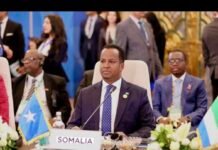Muqdisho – The Federal Government of Somalia has expressed deep concerns over the transparency and accountability of the Bahnano Social Protection Program, which is funded by the World Bank and implemented by the World Food Programme (WFP). The program, which disbursed approximately $153 million in 2024, is intended to support vulnerable Somali families with direct cash transfers and other social assistance measures.

However, a recent report released by Somalia’s Office of the Auditor General (OAG) has raised red flags about the lack of data sharing and coordination from WFP. According to the report, WFP has failed to provide the Somali government with essential data on the number and identities of beneficiaries who have received assistance through the program. This has triggered serious doubts about whether the aid is reaching its intended recipients and has raised broader concerns about accountability and oversight.
“WFP has still not shared the critical data required to verify that the aid is reaching the rightful beneficiaries,” a senior Somali government official said, speaking on condition of anonymity. “This lack of transparency undermines the government’s ability to monitor the use of public funds and ensure that international aid is used effectively.”
Adding to the concerns, the Auditor General’s report noted that a revised agreement between the Federal Government and WFP—one that would mandate data sharing—has not been formally registered or documented within the Auditor General’s office. This omission raises further legal and administrative questions about the implementation of the program and compliance with national oversight regulations.
The Somali government is now calling for improved cooperation and transparency from WFP and other international agencies operating in the country. Officials say that greater accountability is essential to ensure that social protection funds are managed responsibly and that public trust in humanitarian programs is maintained.
“We are committed to building a transparent and accountable system, and that requires our partners to work with us in good faith,” the official added. “These programs are funded for the benefit of the Somali people, and we must ensure every dollar is used as intended.”
The WFP, which holds primary responsibility for managing and distributing the funds under the Bahnano program, has not yet publicly responded to the report or the government’s demands for more data.
The lack of access to program data has left Somali authorities unable to conduct independent verification of the beneficiaries or the overall performance of the program, thereby limiting the effectiveness of government oversight mechanisms and raising questions about the long-term sustainability of foreign aid interventions in the country.
The Auditor General’s office emphasized that unless the current gaps in transparency are addressed, the integrity and credibility of Somalia’s social protection efforts could be compromised.
Background:
The Bahnano program was launched in 2019 as Somalia’s flagship social safety net initiative, designed to support poor and vulnerable households, particularly in times of crisis such as droughts or economic shocks. Funded primarily by the World Bank through its International Development Association (IDA) grants, the program is part of broader efforts to build resilience and reduce poverty across Somalia.
As of 2024, the WFP has been the key implementing partner responsible for delivering cash transfers to tens of thousands of households across various regions of Somalia. However, the latest revelations underscore growing tensions between the Somali government and international agencies over issues of control, transparency, and local ownership of aid programs.
What’s Next:
The Somali government has indicated it may push for formal renegotiation of its agreements with WFP and other partners to include stricter clauses on data sharing, monitoring, and reporting. International donors, including the World Bank, may also come under pressure to intervene and ensure their funds are managed transparently in line with both local and international accountability standards.
Further developments are expected as the government continues its review of aid flows and social protection mechanisms within the country.




